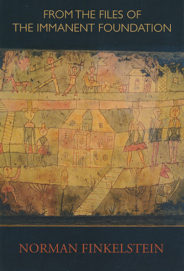 Norman Finkelstein
Norman Finkelstein
Dos Madres Press ($17)
by Alexander Dickow
The back cover of From the Files of the Immanent Foundation quotes from one of the poems, describing the book as
a network of spies and secrets,
an infinite arcanum of hierophants and fools,
residing in a mansion of closets and trapdoors,
stairways and hallways, nested studies surrounding
a library where the scholars sleepwalk forever
and the catalogers despair.
This description resonates well with the book’s seductive atmosphere of secrets always on the verge of divulgation, of total clarity always just out of reach. Finkelstein is nourished by those literatures and practices closest to the universal human desire to go “anywhere out of the world,” as Baudelaire put it in a poem title. He is a passionate reader of weird fiction, fantasy, science fiction, and religion, referencing Kabbalah and H. P. Lovecraft, for instance.
One admirable quality of the book lies in its eminent readability. Finkelstein does not need to torture syntax or create jarring disjunctions to create his atmosphere; in fact, the apparent clarity actually amplifies the Platonist logic of secret and revelation, as the very expression “apparent clarity” already suggests. The temptation to reach beyond the words on the page grows all the stronger when those words seem to hold nothing back, to give themselves without effort or obstacle. The back cover also quotes Nathaniel Mackey, who writes, “I read it wishing it would never end,” and in point of fact, the seeming effortlessness of reading From the Files of the Immanent Foundation made for a similar sentiment in the present reader also; there is a distinct freshness to this acceptance of the givens of the English language as already sufficient to create wonder and produce vivid aesthetic effects. Finkelstein does not need to invent new and ever-stranger tools to make us feel as though we have never read these ordinary words and everyday expressions, to paraphrase Mallarmé.
Let me tarry briefly on this desire to reach beyond the words that are given, to take the words as tokens of something that will be revealed: “No more curios, says the guide, / little gods carved from rosewood, // No more faded posters, costume jewelry, miniatures of doubtful provenance.” The vocabulary of graven images and costume evoke the Platonist logic of mystery and unveiling I referred to earlier. But even without those resonances, the uncertainty of identity (who is this guide?) and purpose (what are these objects for?) also seems to promise some supplement of meaning to be provided later: will we not discover what function these faded posters might fulfill, and where this guide may lead us?
In fact, these desires for a beyond, for a supplement that would provide some plenitude of meaning, are consistently frustrated throughout Files; at the same time, these desires are the very subject and substance of the book. They illuminate the title’s curious irony: that moment when the secret shall finally be revealed seems anything but immanent, and lacks all proper foundation. Meaning rests only upon its own deferral; revelation and the truth lie always just beyond the horizon, around the next corner. And meaning and revelation also remain permanently lacunary—we are given only texts from the files, incomplete excerpts and distorted transmissions.
Those who seek epiphanies in Finkelstein’s book may find only disappointment, but all others will exult in Finkelstein’s beguiling and enduring mysteries.
